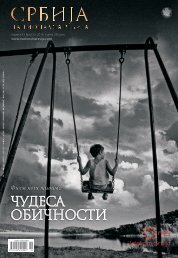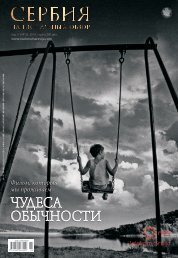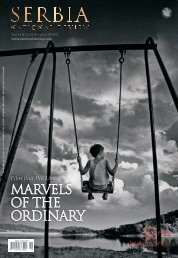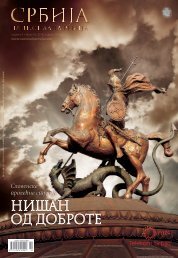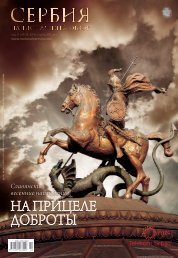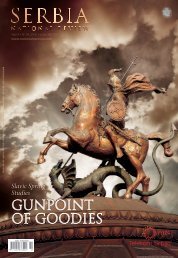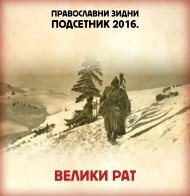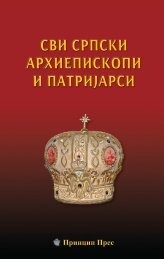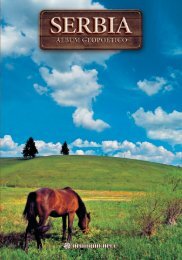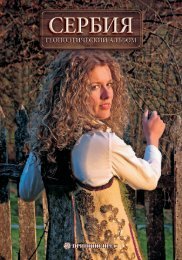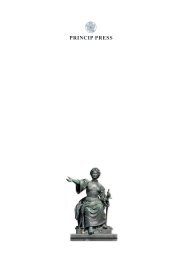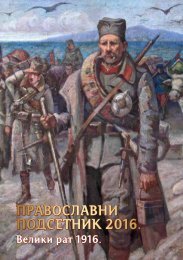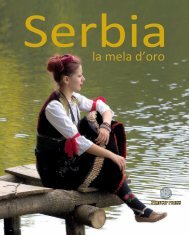Monografija - prvo izdanje - niska rezolucija
You also want an ePaper? Increase the reach of your titles
YUMPU automatically turns print PDFs into web optimized ePapers that Google loves.
Ма шта човек говорио о својој деци, ни похвале ни поку<br />
де неће бити довољно уверљиве, нити убедљиве, као<br />
оцене некога ко ту исту децу посматра са стране, некако више<br />
искоса. Путопис, то је увек тај поглед искоса. Тако посматрано,<br />
путопис више није само штиво за задовољавање знатижеље,<br />
нити је само књижевни род: путопис је и доказни материјал<br />
о обичајима, наравима, о променама, о свему ономе што је<br />
пре големо да би се стисло у историографију или географију, а<br />
премалено да би задовољило очекивања књижевне, по зо ришне<br />
или поетске публике.<br />
Сам тај чин бележења утисака и запажања, те њиховог<br />
по везивања са историјским подацима – научним језиком ре <br />
чено, повезивање емпиријског и спекулативног метода – откри<br />
ва жељу путописца да одређеном „стању ствари” пронађе<br />
„оправдање”, боље речено узроке. Такви путописи, у којима су<br />
запажања танано проткана удубљивањем у корене и исходишта<br />
обичаја, навика или карактера, свакако представљају драгоцене<br />
документе за објективне судове о државама и народа.<br />
историји ове земље... нема скоро ни једне редов<br />
не странице: само ратови, само међусобни<br />
„У<br />
су коби, праћени крвавим сценама... Историја Србије<br />
је историја њеног мучеништва.”<br />
Нажалост, Србија већ вековима муку мучи с лаконским,<br />
површним, често недобронамерним приступом „развијеног света”<br />
њеним проблемима. Још почетком двадесетог века су многе<br />
европске туристичке агенције Србију сврставале у подручја куда<br />
се одлази на сопствени ризик, дакле, „само за авантуристе”. У<br />
роману Оријент-експрес познате енглеске списатељице Агате<br />
Кристи, кондуктер упозорава путнике:<br />
„Пристигли смо у Београд. Даме и господо, обратите посебну<br />
пажњу на свој новац и пртљаг, због велике могућности<br />
да будете опљачкани.”<br />
Последњих петнаестак година, „реклама” за Србију је била<br />
још црња, а тек понегде се помаљао понеки зрак, попут немачког<br />
и светског песника Петера Хандкеа који је у више наврата<br />
претабанао уздуж и попреко домовином Светога Саве, Доситеја<br />
Обрадовића, Иве Андрића, Меше Селимовића, Величковића,<br />
Кустурице, Стефана Миленковића. Није марио Хандке за злослут<br />
не гласове, није марио за предрасуде, није чак марио ни<br />
за грађанске ратове који су беснели на овим подручјима.<br />
68<br />
П. А. Ровински<br />
Whatever a man says about his children, neither in praise<br />
nor reproach, will it be as convincing or persuasive as the<br />
estimates of one who observes the same child from a distance, but<br />
a bit from the side. Travel books help in providing this sideways<br />
perspective, for they often do not just satisfy curiosity or fall into<br />
a literary category, rather they offer proof of the customs, temperaments,<br />
and changes, about the things that are too large to<br />
be constricted in a book on history or geography, and about the<br />
things that are too small to please the expectations of a literary,<br />
theatrical or lyricist audience. The very act of recording impressions<br />
and observations, and then tying them to historical facts<br />
– scientifically speaking the connection of empirical and speculative<br />
methods – reveals the travel writer’s desire for the book to be<br />
a “justification” for “the state of things”. This kind of travel book,<br />
in which observations are delicately interweaved with a plunge into<br />
the origins and outcomes of customs, habits or temperaments,<br />
certainly represents precious documents for unbiased judgments<br />
about countries and nations.<br />
Unfortunately, Serbia has for centuries had its troubles with<br />
laconic, superficial, and the often bad-intentioned approach the<br />
“developed world” took towards Serbia’s problems. Even at the beginning<br />
of the 20 th century, many European tourist organisations<br />
classified Serbia in the regions where one goes at his own risk, thus<br />
“just for the adventurers”. In Agatha Christie’s novel “Murder on the<br />
Orient Express”, a ticket checker warns passengers:<br />
“We have arrived in Belgrade. Ladies and gentlemen, pay<br />
special attention to your money and luggage, because of the great<br />
possibility of being robbed”.<br />
In the last fifteen years the “marketing” of Serbia has been<br />
even darker, and just here and there appeared some ray of light,<br />
such as German and world poet Peter Handke, who on several occasions<br />
crossed over the country of Saint Sava, Dositej Obradović, Ivo<br />
Andrić, Meša Selimović, Veličković, Emir Kusturica, Stefan Milenković.<br />
Handke didn’t care about the ominous voices, nor about prejudices<br />
or even about the civil wars that raged in these regions. The love<br />
of discovery and revelation led him, like it had done for many of his<br />
predecessors, and returned him safely back to his homeland. After<br />
all, the fear of the unknown in wise people is always overpowered by<br />
the wish to experience something new. Only the fear of bad weather<br />
remains. And to overcome that fear it is sufficient to recall the words<br />
of a great German philosopher: “He who counts on nice weather,<br />
would be better off not starting his trip”.



